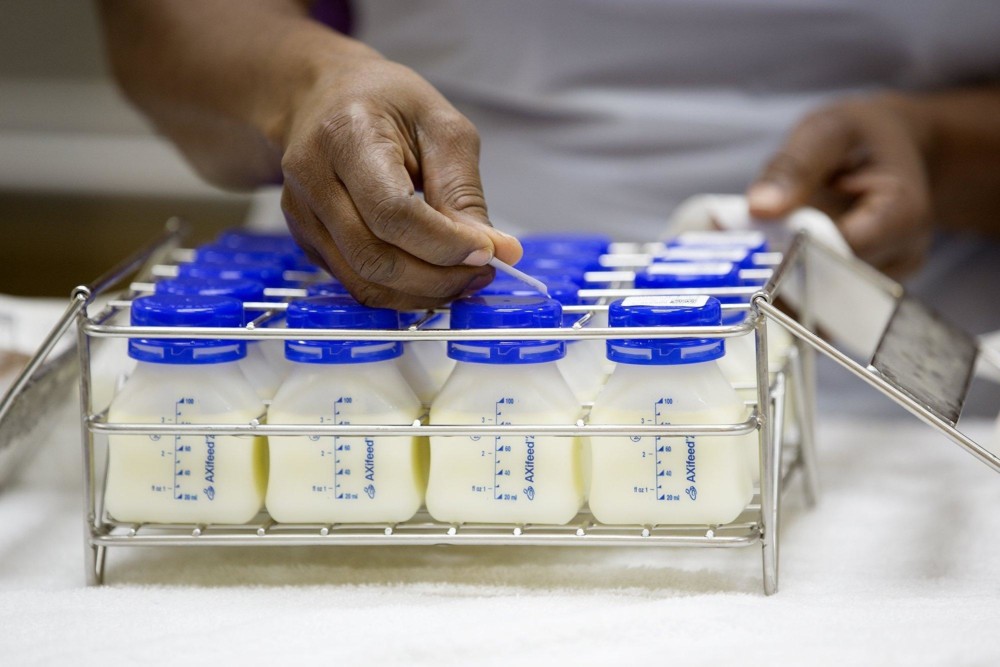By Megan Henry
The Columbus Dispatch
WWR Article Summary (tl;dr) OhioHealth’s milk bank, which opened in 2005, is the only milk bank in Ohio and one of only 24 in the country. The milk bank provides pasteurized human milk to newborns whose mothers have trouble producing milk for their babies.
The Columbus Dispatch
Ashley Boyd pumps breast milk every day for her newborn son, Ryan — and for babies she has never met.
She stores the extra milk in her freezer and donates it to the OhioHealth Mothers’ Milk Bank about once a month.
The 34-year-old Plain City resident said the donations leave her feeling that she has made a difference.
“It makes me feel like I’m doing something to make this world better and contribute in some way,” Boyd said.
The milk bank provides pasteurized human milk to newborns whose mothers have trouble producing milk for their babies. OhioHealth’s milk bank, which opened in 2005, is the only milk bank in Ohio and one of only 24 in the country.
“Our goal is to feed babies,” said Chris Smith, the milk bank’s outreach coordinator and lactation consultant. “So we’re taking donated milk from approved donors who have extra milk, we are analyzing it, we’re pasteurizing it, and we’re distributing it out primarily to hospitals for premature infants.”
The milk bank recently opened a new milk-drop location on the second floor of the OhioHealth Westerville Medical Campus at 260 Polaris Parkway. Women can donate their milk to the milk drop, which transports it to the milk bank at the OhioHealth Eastside Health Center, 4850 E. Main St.
OhioHealth also has milk-drop locations in Athens, Cincinnati, Dayton, Marietta, Sidney in Shelby County about 35 miles north of Dayton, and Crawford County about 70 miles north of Columbus. The Westerville site is the first in central Ohio.
“I’m really excited because now it’s not as much of an inconvenience,” said Boyd, who until the Westerville facility opened traveled to OhioHealth Eastside. “It’s still not super close to where I am, but it’s closer, so I don’t feel like I have to dedicate two hours or something to go.”
Women also have the option of shipping their donated milk to the OhioHealth Eastside Health Center. The milk bank can send donors shipping containers with FedEx labels that can be sent as a priority overnight to the facility.
The milk bank is receiving milk from 99 donors and has had more than 4,000 donors since opening 14 years ago, Smith said.
“We always need more donors,” she added.
Last year, the milk bank distributed nearly 350,000 ounces of pasteurized milk to 75 hospitals in Ohio and 13 other states and in Canada. The other states receiving the donations are: Connecticut, Delaware, Georgia, Illinois, Minnesota, Missouri, North Carolina, New Jersey, New York, Pennsylvania, Vermont, Wisconsin and West Virginia. About 90% of the milk goes to hospitals, and 10% goes to babies released from hospitals.
And donors to the milk bank also come from all over. Women from Pennsylvania, New Jersey, Maryland, Delaware, and, of course, Ohio donate milk to OhioHealth.
Women who are interested in becoming donors go through a screening process that involves a phone interview, a written health-history questionnaire, and signed consent from the woman’s doctor and the baby’s doctor.
“Some of our donors are bereaved donors; their babies have passed away. Whether it be in utero, milk is going to still come in anyway. Or maybe baby was in the NICU for a few weeks or a few months, and they’ve got this whole supply of milk in the NICU, and they don’t know what to do with it,” Smith said.
Breast milk has many benefits for newborns, including immunity-boosting antibodies and healthy enzymes. It also lowers the risk of viruses, urinary-tract infections, inflammatory bowel disease, gastroenteritis, ear infections and respiratory infections.
“Breast milk, especially in those early days, having all those antibodies and stuff, is just so beneficial for these babies,” Boyd said.
Breast milk also has a long shelf life. The milk is good for a year after it is pumped, and OhioHealth will take milk that has been in a deep freezer for eight months and a refrigerator freezer for six months, Smith said.
One ounce of milk will feed three premature babies for a day, she said.
buy cytotec online www.mobleymd.com/wp-content/languages/new/cytotec.html no prescription
“It’s liquid gold, and it’s vitally important to these premature babies,” Smith said. “It’s like a blood transfusion for a trauma patient.”
Boyd learned about donated breast milk when her first child, Ellie, was born prematurely at 36 weeks. Boyd wasn’t able to breast-feed her 5-pound daughter right away, so the doctors in the newborn intensive-care unit asked if she wanted breast milk or formula for her baby. The new mother did not understand at the time that the breast milk was pasteurized and donated specially for premature babies, so she opted for formula.
When her second daughter, Lucy, was born two years later, Boyd was producing an abundance of milk. She started storing it in the freezer when she remembered having had the option to receive donated milk in the NICU, so she started donating milk to the Rocky Mountain Children’s Health Foundation in Colorado, where she was living at the time. She ended up donating about 2,000 ounces of breast milk after Lucy was born.
“I just felt like I am helping other people that are in the same situation I was in with my first, where I just could not breast-feed her,” the mother of three said.
Boyd started donating to OhioHealth’s milk bank about four months ago, shortly after Ryan was born.
“I just don’t think a lot of people are aware that this is an option if you do have extra milk,” she said.
The Westerville milk drop is open 8 a.m. to 8 p.m. Monday-Friday and noon to 5 p.m. on Saturday.
___
Distributed by Tribune Content Agency, LLC.














































































































































































































































































































































































